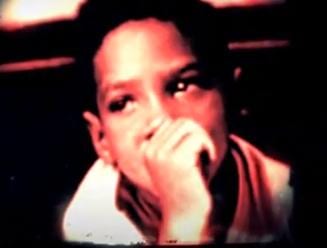
Dancer Justin De Luna is dancing in Real Boys, a Ryerson Choreographic accompaniment to Petrou's project.
A mother reads a book to her son in public. It’s a normal scene, but the three-year-old is shy and nervous. He knows he’s not supposed to be reading about Ariel and her under-the-sea friends. After all, he’s a boy, and boys don’t like The Little Mermaid. He asks his mommy to whisper.
Laurie Petrou doesn’t know if her son is gay or not, but that’s no concern for the Ryerson Radio Television Arts professor. Petrou’s new media project, Boys Will Be Boys, examines societal expectations surrounding the male gender, particularly that expressing a “softer side” is wrong.
“We have this idea that boys are hardwired to be tough,” she says. “But they’re not. That’s a social expectation.”
Although Petrou says her son gravitated toward domestic play and loved the colour pink, he knew he wasn’t supposed to enjoy these things.
“He very quickly realized this is not cool,” Petrou says. This troubled the mother of two. “Not only is that for girls, which means it is off limits for you, but it also tells our girls that things that are coded feminine are bad.”
After Petrou had her two sons, her work as a feminist shifted to male identity, an area of gender studies she says is lacking. Petrou wrote the Boys Will Be Boys piece and arranged a team — including a colleague’s young son, who narrates the clip — to help bring the prose to life.
The YouTube video is just one component of the multimedia project. Petrou also launched an interactive website, breakgendermolds.com, that asks users to examine their assumptions around gender and language.
Being a mother of two young boys has exposed Petrou to other parenting styles, too. She recalls her shock after hearing parents expressing discomfort with their sons’ Christmas wish lists that included a kitchen set and an umbrella. “People are so afraid of this, and I think it’s because they’re afraid of their kids being gay,” she says.
She recently took her concerns about teaching gender and sexuality to the parents’ council at her sons’ school.
“One parent said, ‘I haven’t talked to my kids about sex yet, let alone homosexuality,'” she says. “The conversation very quickly trickled down to this fear, and then to a halt, and nothing came of it.”
She hopes her project can help other parents address gender issues earlier with their sons.
Petrou’s project is seeing new life this month as part of the Ryerson Choreographic Works presentation. Student choreographer Annabel Harvey saw Petrou’s project and immediately thought it would make a great dance number.
“I thought the poem spoke a lot of truth,” she says. Harvey choreographed the short piece to the music and audio of Petrou’s video. Titled Real Boys, the performance will feature two male dancers, one representing the traditional masculine expectations and the other a more “openly effeminate” side, she says.
For dancer Justin De Luna, who will portray the masculine role, the message of Petrou’s piece is a personal one. De Luna is openly gay.
“It just shows that you can’t classify a certain individual as ‘this kind of person,'” he says. “I think it’s really important for people to understand that everyone’s different.”
Petrou has a lot in store for her project. She plans to expand her focus to examine the “trappings of different gender codes,” including transgender identity.
Petrou says much of the solution to societal gender expectations starts with the parenting. It should be about “taking your children’s cues,” she says. “We needn’t try to shoehorn our kids into one or the other identity.”

 Why you can trust Xtra
Why you can trust Xtra


